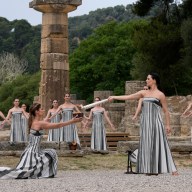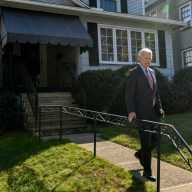 Human rights activist Linda Dye, Defense Forum Foundation President Suzanne Scholte, North Korea refugee and human rights activist Shin Dong-hyuk and Korean Churck Coalition for North Korea Freedom Executive Director Sam Kim march outside the White House while demonstrationg for human rights in North Korea July 10, 2012 in Washington, DC.
Human rights activist Linda Dye, Defense Forum Foundation President Suzanne Scholte, North Korea refugee and human rights activist Shin Dong-hyuk and Korean Churck Coalition for North Korea Freedom Executive Director Sam Kim march outside the White House while demonstrationg for human rights in North Korea July 10, 2012 in Washington, DC.
Credit: Getty Images
While Kim Jong-un continues war talk, North Koreans are in fact busy preparing for planting season. The state news agency, KCNA, makes much fuss about attacking South Korea and the US, but ordinary people in North Korea are more interested in getting the soil prepared.
One resident, Kim, 43, from Kowon, South Hamgyong province, told us, “It is not the first time the regime has declared a war and made a commotion. They will stop.”
“They must be so free, playing a war game”, he added, commenting on how detached the regime is from people’s normal lives.
Kim claims it is well known that even the government officials are merely giving an image of preparing for war. It does not distract him from continuing to go out to the Chinese border area to seek food in his daily life on the farmland.
Another correspondent from inside North Korea told Free NK that, in mid March, the North Korean regime distributed one week’s worth of food and gasoline after it had declared the state of wartime mobilization. Some soldiers, however, managed to sell gasoline in the market, resulting in 1 liter of gasoline to be traded for 1.3 USD.
A festive mood prevailed in Pyongyang as the regime celebrated, with the foreign guests they have invited, the birthday of Kim Il-sung over the week of April 15. However, many citizens of Pyongyang made an attempt to be excused from the events as they, who live from hand to mouth, cannot afford to miss working hours.
However, culture has rapidly diversified in eating, drinking, and playing. American fast-food shops as well as night-time entertainment centers have opened and almost all men have a mobile phone in Pyongyang. There are more and more women who attempt to follow the latest fashion from South Korea, influenced by [Kim Jong-un’s wife] Ri Sol-ju.
Everywhere in Pyongyang these days, inline skating is all the rage. Often spotted are adults and children absorbed in the activity, not only in public squares but on any paved surface.
This focus by Kim Jong-un on preparing attractions for citizens in Pyongyang can be viewed as an attempt to stabilise his regime through the old Roman practice of “bread and circuses”. Often it is said that people in Pyongyang belong to the privileged class; sharing their fate with Kim Jong-un and very different from the vast majority of people whose subsistence level existence leaves little time for leisure pursuits.
Once these people in Pyongyang have explored the ‘pleasures of consumption’; however, who can say what new things they will demand in the future? The path may unfold very differently from what Kim Jong-un expects: for instance, a greater choice in consumption may lead to calls for democracy.
**This article is shared by Free NK (www.ifreenk.com), the newspaper founded and run by North Korean refugees in the UK.
NK survivor: Escape from Camp 14
North Korean escapee-turned-activist Shin Dong-hyuk speaks to Metro about life in a labor camp, personal tragedy and hope for his birth country’s future. Shin Dong-hyuk was born inside a North Korean labor camp and is the only known escapee, making his way to South Korea with the help of a journalist. His brutal experience, including torture and watching his mother and brother’s execution after he reported their escape plans, left him with post-traumatic stress disorder. But he is now an activist keen to promote human rights in his homeland. Metro met the 30-year-old on his campaign visit to Hungary.
Q: You lived with your mother until the age of 12. How did she explain the camp?
A: Even though she was my ‘mother’, it was not like a parent-child relationship that people in the free West have. She never talked to me about the prison, nor did it ever occur to me to ask her what this place was. My relationship with my mother was that, even though I called her ‘Mother’, she was just a fellow political prison camp inmate like myself.
Q: How did your childhood pass in the camp? Did you receive an education?
A: All the prison camp inmates, whether a child or an adult, had to work: I worked in the coal mine, in the fields, in the factory inside the prison camp. I lived with my father for some time as well. Children inmates were taught simple arithmetic, and to read and write, but nothing beyond that. We were taught the rules and regulations of the prison camp.
Q: How many kids were born into the camp? What happened to them – they all stayed like you?
A: I don’t know the exact numbers. If they did not attempt to escape, or if they were not released – which would not have happened – they would have all grown up in the camp and most likely died in there. There was no proper medical care for any of the inmates in the prison camp….
Q: When did you think there should be more to life, that you could maybe flee and live as you wanted?
A: When I first heard about the outside world from the newly-arrived prisoner, when he began telling me about the outside world. This man talked about the things he did and what kind of life he led, but what piqued by interest the most was the fact that he was telling me about all the different kinds of food available outside of the prison camp.
Q: Were you aware of how dangerous it would be to try to escape from a camp?Practically no one who tried survived to tell their stories….
A: I was aware that the prison camp had electrified fence and guards to watch over prisoners, but there never was any thought in my mind to escape or to leave the prison camp; l thought it was my destiny and fate to be where I was, and that I’d remain there for the rest of my life…
Q: What was the most odd thing for you in the free world?
A: The fact that people did not wear prison clothes, that they could laugh freely, that they did not have to bow to police or others in uniforms.
Q: How often do you think back on those times, especially on your mother and brother, who died?
A: I think about them every day. Once I resettled in South Korea, due to PTSD (post-traumatic stress disorder), I had to deal with the nightmares, and I therefore sought psychiatric help at a hospital for a few months.
Q: How did you become a human rights activist?
A: There was no clear date or time, but as people and different groups began to invite me to speak, I suppose that is when I became an ‘activist’ for NK human rights and for the political prison camp issue…
Q: What is your opinion on the current North Korean regime and the leader, Kim Jong-un? Do you see hope for the future?
A: He is just a young kid, younger or around the same age as me, who may act like he is reforming, but he is nothing but a dictator just like his own father and grandfather. I do see hope, but when that hope will come, I do not know. My immediate concern is the up to 200,000 political prison camp inmates throughout North Korea. No one cares about them. No one wants to help them. My fellow inmates, they need hope too.
(Interview by Szonja Krezinger, Metro News World in Budapest, Hungary)












